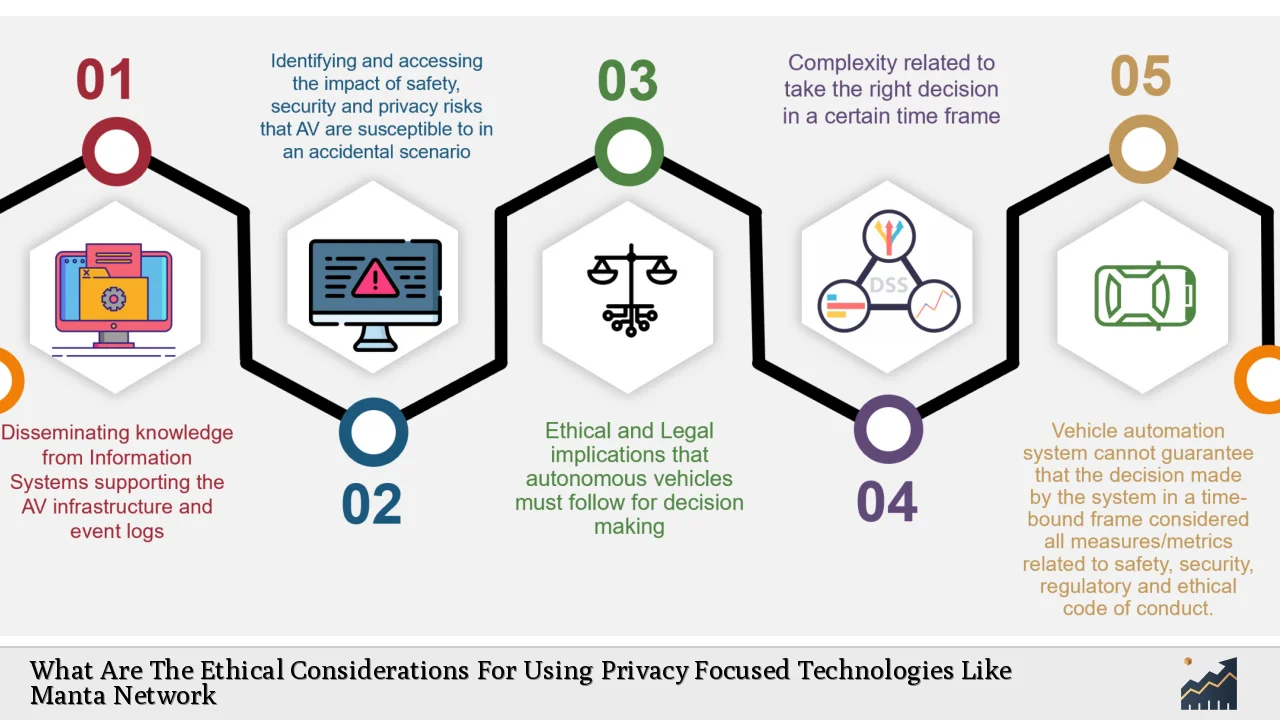The rise of privacy-focused technologies, particularly in the blockchain and cryptocurrency sectors, has sparked significant discussions around ethical considerations. Manta Network, a prominent player in this space, leverages advanced cryptographic techniques to ensure user privacy while facilitating decentralized finance (DeFi) operations. This article explores the ethical implications of such technologies, focusing on their impact on user privacy, regulatory compliance, and societal norms.
| Key Concept | Description/Impact |
|---|---|
| Privacy Preservation | Manta Network employs zero-knowledge proofs (ZKPs) to enable confidential transactions without revealing user identities or transaction details. |
| Regulatory Compliance | The use of privacy technologies raises questions about compliance with regulations like GDPR and CCPA, which mandate transparency in data handling. |
| Potential for Abuse | While privacy technologies can protect users, they can also be exploited for illicit activities such as money laundering and tax evasion. |
| User Control | Decentralized systems must empower users with control over their data to prevent misuse and enhance trust. |
| Ethical Development | Developers must consider the ethical implications of their technologies to avoid perpetuating existing inequalities and power structures. |
Market Analysis and Trends
The global privacy-enhancing technologies market is projected to grow significantly, with an estimated value of USD 2.60 billion in 2023 and a compound annual growth rate (CAGR) of 25.3% expected through 2030. This growth is driven by increasing concerns over data protection and compliance with stringent regulations such as the General Data Protection Regulation (GDPR) and the California Consumer Privacy Act (CCPA).
Manta Network’s focus on privacy aligns with these market trends, as it offers solutions that cater to the growing demand for secure and anonymous transactions. The integration of zero-knowledge proofs allows Manta Network to facilitate private swaps and payments within its DeFi ecosystem, thus addressing user concerns about data security.
Implementation Strategies
To effectively implement privacy-focused technologies like Manta Network, stakeholders should consider the following strategies:
- User Education: Providing clear information about how privacy technologies work can help users understand their benefits and limitations.
- Robust Security Measures: Implementing strong encryption protocols and access controls is essential to protect user data from unauthorized access.
- Transparent Policies: Organizations should establish clear data governance frameworks that outline how user data is collected, stored, and used.
- Community Engagement: Involving users in the development process can foster trust and ensure that privacy solutions meet their needs.
Risk Considerations
While privacy-focused technologies offer significant benefits, they also present various risks:
- Regulatory Risks: The evolving regulatory landscape poses challenges for companies like Manta Network. Non-compliance with data protection laws can lead to legal repercussions.
- Technological Complexity: The implementation of advanced cryptographic methods such as zk-SNARKs may be challenging for developers, potentially leading to vulnerabilities if not executed correctly.
- Market Competition: As more projects emerge in the privacy sector, Manta Network faces competition from other blockchain solutions that also prioritize user anonymity.
Regulatory Aspects
The ethical use of privacy-focused technologies necessitates compliance with regulatory frameworks designed to protect consumer rights. Regulations like GDPR emphasize transparency in data handling practices. Companies must ensure that their use of privacy technologies does not conflict with these regulations.
Moreover, as governments worldwide grapple with the implications of cryptocurrencies and decentralized finance, there is a growing need for clear guidelines that balance innovation with consumer protection. Manta Network must navigate these complexities while advocating for responsible use of its technology.
Future Outlook
The future of privacy-focused technologies appears promising as societal demand for data protection continues to rise. Manta Network is well-positioned to capitalize on this trend by enhancing its offerings and expanding its ecosystem.
Key factors influencing this outlook include:
- Technological Advancements: Continuous improvements in cryptographic techniques will enhance the effectiveness of privacy solutions.
- Increased Regulatory Scrutiny: As regulators become more vigilant about data protection, companies will need to adapt quickly to maintain compliance.
- Growing Public Awareness: Increased awareness among consumers about data privacy issues will drive demand for transparent and secure solutions.
Frequently Asked Questions About Ethical Considerations For Using Privacy Focused Technologies Like Manta Network
- What are zero-knowledge proofs?
Zero-knowledge proofs are cryptographic methods that allow one party to prove knowledge of a value without revealing the value itself, enhancing transaction confidentiality. - How does Manta Network ensure user privacy?
Manta Network employs zk-SNARKs technology to facilitate private transactions on its platform without exposing sensitive information. - What are the regulatory challenges facing privacy-focused technologies?
Privacy-focused technologies must comply with regulations like GDPR and CCPA, which require transparency in data usage and handling. - Can privacy technologies be used for illegal activities?
While designed for legitimate purposes, privacy technologies can be misused for illicit activities such as money laundering or tax evasion. - How can developers ensure ethical use of privacy technologies?
Developers should consider the societal impact of their technologies, prioritize user control over data, and adhere to ethical guidelines during development. - What role do consumers play in ensuring ethical practices?
Consumers can advocate for transparency and accountability from companies using privacy technologies by demanding clear policies regarding data usage. - What is the future outlook for privacy-enhancing technologies?
The market for privacy-enhancing technologies is expected to grow significantly due to increasing concerns over data protection and regulatory compliance. - Why is user education important in implementing these technologies?
User education helps individuals understand how these technologies work, fostering trust and encouraging responsible usage.
In conclusion, while Manta Network represents a significant advancement in blockchain technology focused on enhancing user privacy through innovative solutions like zero-knowledge proofs, it also raises critical ethical considerations. Stakeholders must navigate these complexities carefully to promote responsible use while addressing both consumer needs and regulatory requirements.

